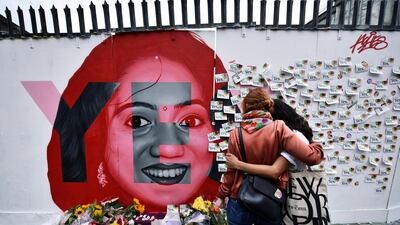As crowds gathered in the courtyard of Dublin Castle on Saturday to celebrate Ireland’s landslide referendum vote to repeal a ban on abortions, the chant broke out of “Savita! Savita!” — the name of an Indian dentist who became the tragic face of Ireland’s pro-choice campaign.
Savita Halappanavar, who lived in the western town of Galway, died in 2012 at the age of 31 after a septic miscarriage. She was 17 weeks pregnant at the time. Her repeated requests to terminate her pregnancy on medical grounds had been refused because the 8th amendment of Ireland’s constitution prohibits abortion.
Savita’s death triggered an uproar across Ireland. The government ordered an inquiry into her death which concluded it was the result of “medical misadventure” — the rough equivalent of malpractice. Savita’s husband settled with the state-run hospital out of court for a sum running into six figures, and the abortion laws were amended in 2013 to allow termination of pregnancies in extreme cases where the woman's life is in danger.
Murals of Savita began to appear around Dublin as Friday’s referendum approached, and activists carried placards with her face and name as they urged people to vote in favour of repealing the 8th amendment.
_______________
Read more: Misinformation row as Ireland votes on legalising abortion
_______________
Savita's parents played their part from their home in the Indian town Belgaum, Karnataka, releasing a video appeal to Irish voters last week.
Andanappa Yalagi read from a one-page letter as his wife Mahadevi sat on a sofa beside him with a photo of Savita, who had moved with her husband Praveen to Ireland in 2008.
“No family in the future should have to undergo what we have gone through,” Mr Yalagi said. “The agony and sorrow are still persistent in our hearts after six years.
“I hope that the people of Ireland will remember the fate of … Savita on the day of the referendum and vote Yes, so that what happened to us won’t happen to any other families.”
Savita's case appears to have played a big part in influencing the outcome of the vote. Almost 10 per cent of those who voted in favour said that her death influenced their decision, Kitty Holland, the author of Savita: The Tragedy That Shook A Nation, told the Times of India newspaper.
"She was very widely remembered during the referendum," Marc Quinn, an environmental conservationist in Dublin, told The National. "I knew people on Facebook who changed their photo to hers, or who shared her photo."
Sabaratnam Arulkumaran, the doctor who headed the government inquiry into Halappanavar’s death, had also publicly called for a yes vote, “for the sake of women’s health and rights”.
After the result of the referendum showed 66 per cent of voters in favour of repealing the 8th amendment, Irish Prime Minister Leo Varadkar, who is partly of Indian origin, called it "the culmination of a quiet revolution" in Irish society.
At a large streetside mural of Savita in Dublin, people left letters, flowers and candles over the weekend. “I voted for you, Savita, I’m sorry we failed you,” one note read. “We will never forget Savita,” said another. A third: “If I have a daughter I will name her Savita after you.”

Mr Yalagi, 72, said he and his wife had waited eagerly to learn how the vote turned out and professed himself to be “very happy” with the result.
"We feel like we have now got justice," the retired electrical engineer told The National. "I want to thank the voters in Ireland who voted 'yes'. I feel like the society responded to the death of my daughter."
The repeal of the abortion ban is not automatic. The government has said it will draft new legislation that will allow abortions until the 12th week of pregnancy. Terminations of pregnancy will still be possible after that if the mother’s life is in danger, as was the case with Savita. Mr Varadkar said he expected the new law to be passed by parliament within six months.
“I hope they name it after Savita," Mr Yalagi said. "I hope they call it Savita’s Law. It will be a good way to remember her.”

